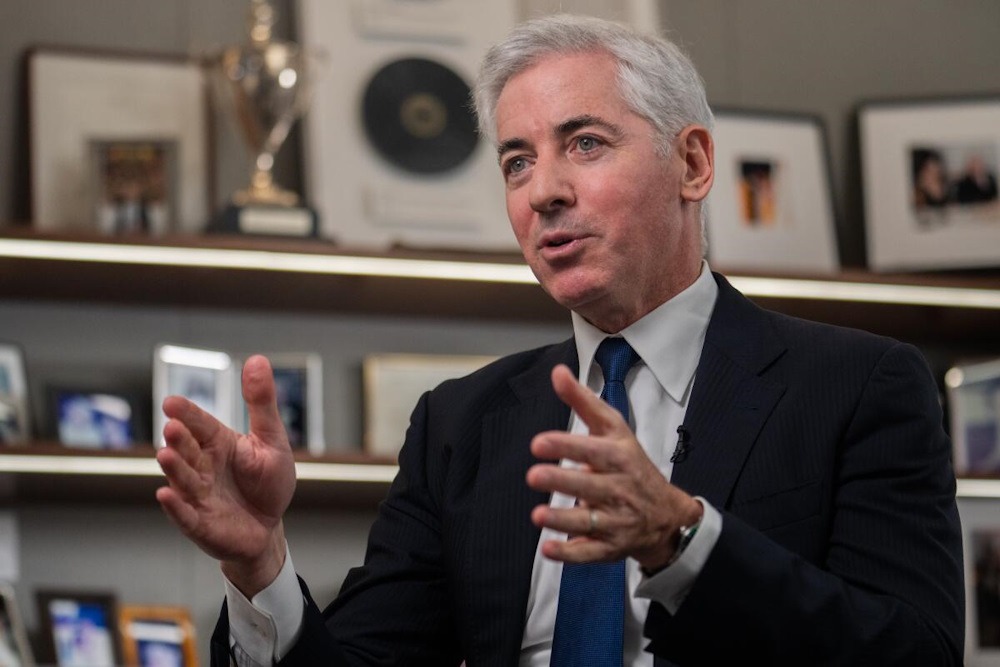Facebook Scammer Posing as Bill Ackman Is Defrauding Millions of Misguided Investors

The fight between Bill Ackman and Bill Ackman is becoming increasingly futile. Facebook imposters pretending to be the wealthy hedge-fund manager Ackman continue to con artists who prey on unsuspecting investors in stock-market scams, and the real Ackman is helpless to stop them.
Pershing Square Capital Management, which Ackman heads, has discovered over ninety advertising that pose as him. The company reported several of the ads to Facebook, but according to spokesperson Fran McGill, they stayed accessible for weeks after that. Victims were advised to “hold these three stocks and you’ll be a millionaire.” One advertisement offered profits of 125% per year, while another promised 25% in as little as one week.
Others appeared as soon as they were taken out.
This is just like a game of whack-a-mole, McGill remarked. “This has been a major issue, and all social media platforms should do more to protect their users from frauds like these.”
There are other billionaires who have found their audience on social media besides Ackman. Numerous advertisements that mimic Cathie Wood’s likeness have been detected by ARK Investment Management. In recent months, imposters posing as Fidelity Investments’ Peter Lynch, Bridgewater Associates’ Ray Dalio, and New York Mets owner and hedge fund manager Steve Cohen pushed variants of the same hoax.
Victims are tricked into joining WhatsApp groups by the adverts, which claim to be associated with the famous investors and offer investment suggestions. Actually, all they are is a modern spin on the old pump-and-dump method. Millions of dollars have gone down the drain for amateur investors.
Even if they were highly planned and smart, it is always humiliating to fall victim to a hoax, as Peter Bourget, an Atlanta construction company owner, learned the hard way. Bourget lost $45,000 when the penny stocks he was advised to invest in crashed.
Some have raised concerns among regulators. “Finra has seen a recent significant spike in investor complaints resulting from recommendations made by fraudulent ‘investment groups’ promoted through social media,” said the securities industry regulator on January 11.
According to the Federal Trade Commission, which oversees unfair business activities in the United States, the reported losses from imposter scams increased threefold from 2019 to 2023, reaching $2.7 billion. “Increasingly prevalent and harmful” is how FTC marketing practices attorney Christopher Brown described the trend.
Facebook used AI to thwart phony accounts, and Meta said in September 2021 that 40,000 individuals, including independent contractors, were engaged in safety and security efforts. Experts, however, claim that in the wake of multiple rounds of layoffs at Meta, similar initiatives have subsequently stalled.
The nine victims of the scam addressed a letter to Facebook on February 28th, describing the twenty-one instances in which members of the group reported scam ads by Ackman, Cohen, and Wood to Facebook in January and February. Officials from Facebook responded to all of the criticisms, according to the letter, by saying the ad “doesn’t go against our standards.”
In December, ARK’s Wood had her “Meta Verified” account set up by her colleagues in the hopes that Facebook would remove the false advertising faster afterward. Earlier this month, Ackman registered for one.
Using every tool at their disposal, scammers are always finding new ways to elude authorities, according to a release from Meta. We prohibit ads that attempt to swindle individuals by using public figures, have specific detection techniques to identify fraudulent activities (including celeb-bait), and spend considerably in our professional review and enforcement teams.
According to Facebook, reporting fraudulent accounts and ads is encouraged by corporate policy. In the second quarter of last year, the business eliminated 1.1 billion pieces of spam content, with 95.3% of that removal occurring before anybody reported it.
The advertising’ level of intricacy varies, but they all follow the same pattern and, at times, utilize the same wording to lure investors into a WhatsApp group where they are promised to speak with a putative team member. Ackman, Wood, and Dalio all used the same name in their ads.
“Join us and you will get the opportunity to double your income and achieve financial freedom more easily.” — a deepfake video purporting to show Lynch, a former manager of the Fidelity Magellan Fund, on CNBC’s “Squawk Box” show.
On January 17, a fake ad for Steve Cohen titled “Steve’s Wealth Sharing” surfaced on Facebook. It stated, “A stock I shared in the group last month rose by 45%.” False Wood Facebook advertising likewise claimed a 45% increase, sometimes in a week and other times in a month.
In addition, advertisements featuring Dalio and Wood both boast about the 87% weekly return on their stock picks and use the same passionate rhetoric to forecast their future success: “The best of these companies will unleash nuclear-like growth in 2024,” Dalio’s ad states.
Such astronomically high returns—153% in 2020 and 68% in 2023—have really occurred in Wood’s flagship ARK Innovation fund. On the other hand, it had significant declines of 23% in 2021 and 67% the following year. With a 7.6% decline in 2023 and a 9.4% increase in 2022, the genuine Bridgewater flagship has been significantly less nuclear. Dalio gave up management of the company in 2022.
Skeptical comments were drawn to several of the false Facebook ads; one person even went so far as to say that the real Cohen had no need to assist “ordinary folks” in amassing fortune through “some sketchy operation.” A third person made the quip, “I hope this group does better than Stevie is doing with the Mets.”
The difficulty in removing the false posts has irritated the staff at Cohen’s Point72 Asset Management. Even after Facebook removed the post from January 17, another one appeared shortly thereafter.
According to Matt Burton, a venture-capitalist who has experience working for ad-tech companies acquired by Google and Facebook, scammers may target Facebook users because to the platform’s older user base, which tends to be wealthier and less tech-savvy than Instagram or TikTok. Moreover, he mentioned that “Facebook has look-alike audience targeting for people who have clicked on ads like these.”
Two fictional individuals posing as associates of Cathie Wood from a separate fictional company named Red Sea Fortune Investment would frequently moderate a number of WhatsApp groups after directing victims of the Cathie Wood scam to a Facebook page that inquired about their investment background.
Following this, they persuaded the victims to join a “VIP room” in order to receive personalized investment recommendations. An imposter posing as an assistant named Ava Evans allegedly urged a victim to increase her investment with each trade by showing her photos of her breakfast and flowers and asking her personal questions.
A warning was made by Cathie Wood’s ARK against such scams, and in January, its director of operations, William Scherer, announced on LinkedIn that he had been the victim of impersonation. “Beware of any WhatsApp messages that appear to be from me; they are all scams,” he warned.
According to Bourget, the owner of the construction company, he became disillusioned with traditional banks and stock market advisors who told him “we might be able to get you 5% or 10% on your money if the market doesn’t tank” (as it did in 2022). Last fall, he clicked on a Cathie Wood Facebook ad and joined a group.
According to Bourget, the WhatsApp group communications led one to believe that they were part of an investment club with access to thorough market data, and that “all sounded very legit at first and they put a lot of effort into building your confidence.” Victims were urged by certain con artists to “liquidate their 401ks, mortgage their homes, borrow from friends” so that they could “double their money” on the group’s stock picks.
Although he had lost half of his assets trading penny stocks on the Hong Kong exchange, he remained in contact with the group’s leaders since they had assured him that they would pay for 80% of his losses. He turned it down after realizing it might necessitate other transactions.
An purported pump-and-dump strategy caused the Hong Kong stock losses. Scammers in this type of scheme sometimes use victims to artificially inflate the price of a penny stock, which they subsequently sell for a profit.
Hartford, Connecticut-based investor lawyer Josh Kons, who is representing a Nashville couple who lost $1.3 million, stated that looking back, it’s obvious that only a handful of the approximately 30 individuals in their WhatsApp group were genuine. The others seemed to be imposters who falsely lauded the group’s leaders and claimed that their stock recommendations had been lucrative.
According to Kons, the operators’ level of sophistication is mind-boggling.
Four out of five U.S. stock recommendations generated money for Kons’ Nashville clients in October and November, and one Hong Kong stock gained 15% in four days at the beginning of December.
They were encouraged to purchase two further Hong Kong penny stocks, DreamEast Group and Super Strong Holdings, around the end of December, as their bets were increased in size. However, on the same day, DreamEast Group’s value dropped 90% and Super Strong Holdings’ value dropped 98%. Their assets were wiped out, they were forced to apply for Social Security benefits early, and they are now contemplating returning to the workforce.
A victims’ group was finally formed when several investors shared their experiences on the social media site Reddit. With 29 members currently, the organization is aiming to recoup part of the estimated $3.2 million they’ve lost altogether.
“We believe a majority of this activity is being orchestrated by individuals outside of Finra’s jurisdiction, and who may be located outside of the United States,” stated Blake Snyder, senior director of Finra’s financial intelligence branch, via a spokesman.
According to media expert Kai Falkenberg, it is not apparent if Facebook and other social-media networks may be held responsible for this particular hoax. Recent case law has divided courts on the applicability of a federal statute passed in 1996 that absolves online platforms of responsibility for misleading information made by others to the unlawful use of a celebrity’s likeness.
Platforms are protected from claims based on content (including advertisements) that they did not produce or develop according to Section 230 of the Communications Decency Act. Falkenberg, however, emphasized that the immunity does not cover intellectual property claims. Such claims could be brought by the impersonated celebrities who feel their rights to publicity have been violated.


